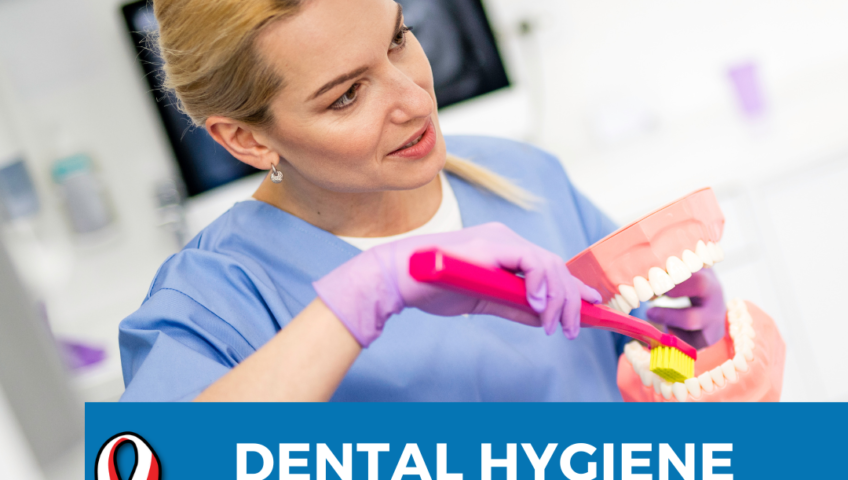October is National Dental Hygiene Month, saluting dental hygienists and the role they play in patients’ health and well-being including sharing the dental hygiene tips every patient should hear.
A dental hygienist is an oral health professional who is responsible for preventing and treating oral diseases. Hygienists perform many preventative dental procedures in an office, such as teeth cleaning and examining patients for oral diseases. They also educate patients on ways to improve and maintain good oral health. Dental hygienists need special training and a licensed hygienist can include RDH after their name.
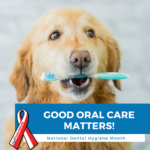 “Brush and floss the teeth you like and you want to save.”
“Brush and floss the teeth you like and you want to save.”
Vidushi Gupta, DMD
Precision Periodontics & Implant Dentistry | Washington DC
Good dental care is essential for people of all ages! The American Dental Association recommends starting immediately! Begin by cleaning the baby’s mouth during the first few days after birth by wiping the gums with a clean, moist gauze pad or washcloth. As soon as teeth appear, start brushing twice a day, and once there are two teeth that touch, begin cleaning between them as well.
Regular cleanings and preventative care can help you to keep your smile healthy and looking good for years. In a study by the American Dental Association, 95 percent of respondents in a study considered oral health a critical component of general wellness. In addition, 80 percent of people in the study felt that having a healthy, white smile helped with feeling good about their appearance and played a role in career advancement.
Dental Hygiene Tip #2: We are partners in the success of your dental treatments.
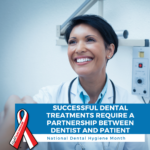 “Use of a water flosser is a game-changer! Your oral hygiene is a large part of success for all dental treatments, better oral hygiene will help deliver better results every time.”
“Use of a water flosser is a game-changer! Your oral hygiene is a large part of success for all dental treatments, better oral hygiene will help deliver better results every time.”
Gillian Plummer-Molina, BSc, DMD
Vanderbilt Estates Dental | Naples, FL
Even though 80% of people feel that having a healthy smile is important, 23% of Americans have gone two or more days without brushing their teeth. 37% of adults 18-24 admit they haven’t brushed their teeth in 2 or more days. The sticky biofilm that builds on your teeth called plaque, starts to immediately form after eating carbohydrates. If it is not brushed off, it hardens into tartar within 48 hours. Tartar, or dental calculus, is essentially hardened plaque that will trap stains and bacteria.
The American Dental Hygienist’s Association recommends water flossing to help remove food particles from your teeth and might help reduce bleeding and gum disease — but it isn’t a substitute for brushing. The water pick can help remove food and plaque in hard-to-reach places that are often missed or under-cleaned.
Dental Hygiene Tip #3: Taking care of your teeth affects more than your mouth
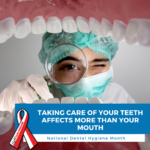 “Your mouth is the gateway to your body’s well-being.”
“Your mouth is the gateway to your body’s well-being.”
Javier Portocarrero, DMD
Alluring Smiles | Mesa, AZ
Oral health can give insights into your total health. The link between the health of your mouth and the health of your body is called the oral-systemic connection. Dental exams are often where diseases like diabetes, cancer, and Crohn’s disease are first detected. Many of the early symptoms of these diseases appear first in the mouth. And, going in the other direction, it has been found that periodontal disease has connections with many other ailments that affect the rest of the body. Learn More about Gum Disease and Your Total Health.
Dental Hygiene Tip #4: You can brush too much and you can brush too little.
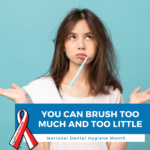 “If your gums are bleeding when you brush, it might not be that you are brushing too much, it might mean you are not brushing enough!”
“If your gums are bleeding when you brush, it might not be that you are brushing too much, it might mean you are not brushing enough!”
Lilia Marcela Ferral, DDS
Excellent Dental Specialists | New Braunfels, TX
Over brushing your teeth means both the time spent brushing and how you brush them. Extremely vigorous brushing can wear away the protective enamel on your teeth and put you at risk for sensitivity, cavities, and gum recession (which furthers your risk for sensitivity and cavities).
Not brushing your teeth enough allows plaque to accumulate and harden into tartar. If this happens at your gum line, then the bacteria can trigger an immune response and cause gum disease. Red, puffy gums are the first stage of gum disease, called gingivitis. When your gums are inflamed, they are more likely to bleed when you brush.
Dental Hygiene Tip #5: Stay positive – every day brings a new chance to increase dental hygiene
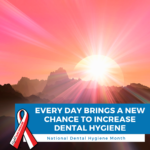 “Let’s get rid of shame when patients come to the dentist. We all know when we have been neglectful and we need to tell patients ‘Today is a new day!’ Let go of the past and let’s move forward.”
“Let’s get rid of shame when patients come to the dentist. We all know when we have been neglectful and we need to tell patients ‘Today is a new day!’ Let go of the past and let’s move forward.”
Brian Tuttle, DDS
Tuttle Family Dentistry | Colorado Springs, CO
A shout out to all of the hygienists who help us to take care of our smiles with education and reminders. And a special thank you to those who focus on helping us save our teeth! Yes, today is a new day and we promise to floss tonight!
¨Smile is the beauty of the soul.¨- Lailah Gifty Akita

